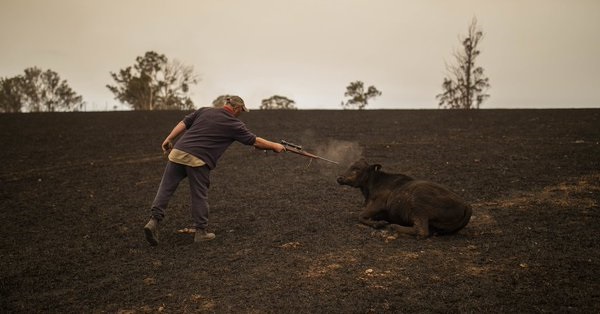Hundreds of bushfires in east and south Australia are wreaking havoc on native animals that have either died or are being severely impacted through lost habitat, starvation and displacement.

In recent days, viral photos of thirsty and exhausted koalas being provided water by a cyclist or a driver have generated huge interest regarding the impact of the bushfires on animals across the world.
“The worst ones are the ones you see sitting on the ground, all hunched up,’’ says John Grant, spokesman for 2,600-strong volunteer-run Wildlife Information Rescue & Education Service (WIRES).
“They are not going to recover because they have inhaled so much heat and smoke.
“They aren’t dead but they won’t survive.’’
So far, more than seven million hectares of land or the size of the Czech Republic, have already burned across the country since the bushfire season started in September 2019.
More than 800 million native animals have been affected or killed in the blazes in New South Wales (NSW), the worst-hit state where about five million hectares of land has already burned, according to Prof. Chris Dickman, an ecologist with Sydney University.
In Victoria, where more than one million hectares of land has already burned, “it is estimated that as many as 500 million animals, including critically endangered species, have already perished in the bushfires,’’ Zoos Victoria’s CEO, Jenny Gray, told reporters.
Sue Ashton, the director of the country’s only Koala Hospital in bushfire-impacted Port Macquarie, estimates tens of thousands of koalas have perished across the country.
“In our area alone, hundreds of koalas have died.
“In one small area where we have been studying the population for a long time, 350 or two-thirds of the population, perished,’’ Ashton told dpa on Monday.
“There are dozens of habitats of a small koala population across the country and a lot of those have been incinerated and turned to ash.’’
Grant says the situation on the ground is “extremely distressing’’ as they try to rescue and treat animals impacted by the bushfires.
“We see animals suffering from dehydration, exhaustion and burns.’’
The WIRES volunteers, some of whom have had their properties damaged due to the blazes, have received thousands of birds – many of them falling from the skies due to heat exhaustion – as well as kangaroos, wallabies, wombats, koalas, gliders and possums.
“Many mothers are turfing their joeys from their pouches in order to save themselves.
“We are worried about the next generation,’’ Grant said, adding many animals had to be put to sleep due to complications.
“We are not even able to estimate the impact on wildlife.
“In December we received 20,000 phone calls for help,’’ he told dpa.
“We are not a scientific organisation, but the damage and destruction to the animals and their habitat is unprecedented.
“It’s uncharted territory.’’
Euan Ritchie, a wildlife ecology and conservation professor at Deakin University, says it is “too early to assess the full toll of these fires on species’’.
“But given their huge size and severity, and that they’re still burning in many areas, already threatened species may have been pushed over the edge to extinction and once relatively common and more abundant species may now be vulnerable.’’
“We have grave fears for many rainforest species, which typically don’t experience fire and hence aren’t particularly resilient.’’
More than 150 hectares of land has already burned on Kangaroo Island in South Australia.
Wildlife officials there estimate half of the animals, including koalas, have either died or will die.
Only Kangaroo Island has koalas free of chlamydia, a sexually transmitted disease that has impacted more than half of their population elsewhere in the country.
Sam Mitchell, Kangaroo Island Wildlife Park co-owner, told Adelaide Now newspaper that the fires may have killed about half of the 50,000-strong koala population.
